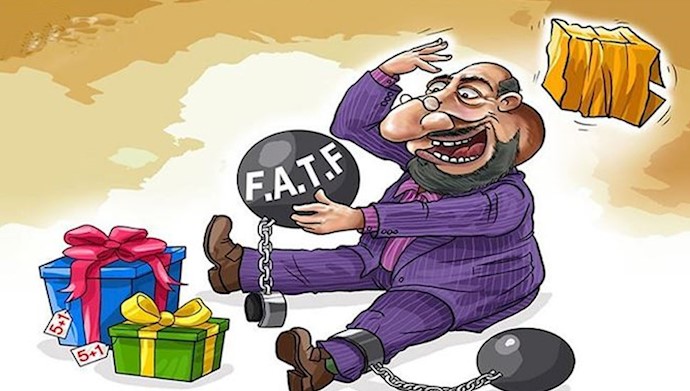Analysis by PMOI/MEK
Iran, April 26, 2019 – The bills related to the Financial Action Task Force (FATF) are still under review in Iran’s Expediency Discernment Council and proponents from both factions, as much as the opponents, are dragging the council to abide by their political position.
Amid this fiasco, most evident is the fact that the Iranian regime Supreme Leader Ali Khamenei lacks both the power and authority to make a decision and accept the consequences and responsibility that come with it.
On April 23, Keyhan newspaper, known as Khamenei’s semi-official mouthpiece, published an article titled, “The Expediency Discernment Council’s procrastination in disapproving the FATF is not expedient,” accusing the council members of leaving the Palermo and CFT bills in limbo.
“After the FATF, in its recent statement, suspended Iran again from its blacklist for a period of four months, proponents of the FATF asked for this bills to be approved so they can facilitate Iran’s financial and trade exchange. However, the Expediency Discernment Council referred the decision on these bills to a review of all their dimensions,” Keyhan wrote.
While Keyhan has always been a staunch opponent of joining the FATF, it quoted Hossein Mozaffar, a former member of former Iranian president Mohammad Khatami’s cabinet and a current member of the Expediency Council, saying: “If Europeans respect their obligations, there will be a good foundation for reviewing Palermo and CFT.”
Yousef Moulayi, an Iranian pundit close to the so-called moderate faction of the mullahs’ president Hassan Rouhani, who is in favor of approving the FATF, warned about the economic consequences of not joining this international covenant.
“If [the regime] wants to have financial and monetary exchanges with the world, it needs to move along the lines of transparency to prevent money laundering and the crimes related to transporting money, and thus gain the world’s trust. Therefore, a lack of financial exchanges with the world resulting from not joining the FATF will isolate [the regime],” he said.
In a recent speech, Mohammad Bagher Ghalibaf, former Revolutionary Guards (IRGC) member and former mayor of Tehran and a close Khamenei ally, warned that “joining the FATF before sanctions are lifted is tantamount to suicide.”
“If the ways to circumvent the sanctions are revealed to the enemy, what should we do?” Ghalibaf asked.
He then went on to disagree with the solutions of both political factions to the FATF problem and revealed the dead-end currently facing the Islamic Republic.
“Implementing the FATF’s recommendations isn’t an adequate response to this question,” he said about the solution placed forward by FATF proponents.
“On the other hand, some say, and rightly so, that we shouldn’t accept [the FATF] and should just say no. OK, now we say no. [But] what do we do with the increasing pressures? What is the plan of action for the tomorrow of saying no?” he then asked about FATF opponents.
Ghalibaf then argued that the best way forward is to stall and buy time.
“Both solutions don’t lead to our desired result. So, we have to build a path. In fact, the key ingredient of ‘building a path’ and proactively confronting the FATF is ‘time’. We need time so that we have detailed knowledge to come up with a solution for tomorrow’s problem,” he said.
In response to Ghalibaf’s statements, IRAN newspaper, the official mouthpiece of Rouhani’s government, published an article titled “Mr, Ghalibaf, enough talking about generalities and provide a solution.”
“The government has blueprinted bills and the parliament has passed them. Now, so much stalling and delay in the [Expediency] council’s decision is questionable. Unless you say that these delays are designed to buy time-based on a schedule and define strategy, and are in line with our national interests. However, the opponents’ statements show otherwise,” the article reads in part.
The IRAN newspaper then finds the roots of the delay in an inability to make a decision and without directly referring to Khamenei.
“What is more evident is a weakness in decision making. Now, where this weakness comes from is an issue that needs more investigation,” the piece adds.
Ali Motahari, the deputy speaker of the regime’s Majlis (parliament), also weighed in on this matter.
“If we don’t join FATF, there will be even more problems for our banking and financial relations,” Motahari said reiterating the need for approving the FATF bills.
He then implicitly holds Khamenei responsible for the decision making delay.
“The members of the Expediency Discernment Council do not enjoy independence in their votes, meaning they are not independent thinkers. They are waiting for a message. If there is a cue [in the message] all the members will be proponents and if the cue is different all of them will become opponents [of the FATF bills],” he concluded.





